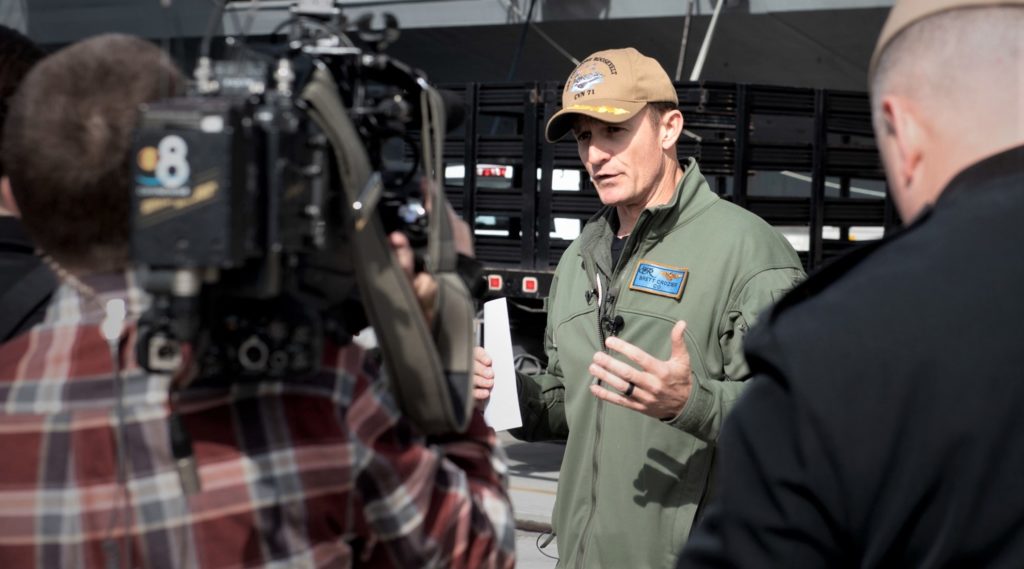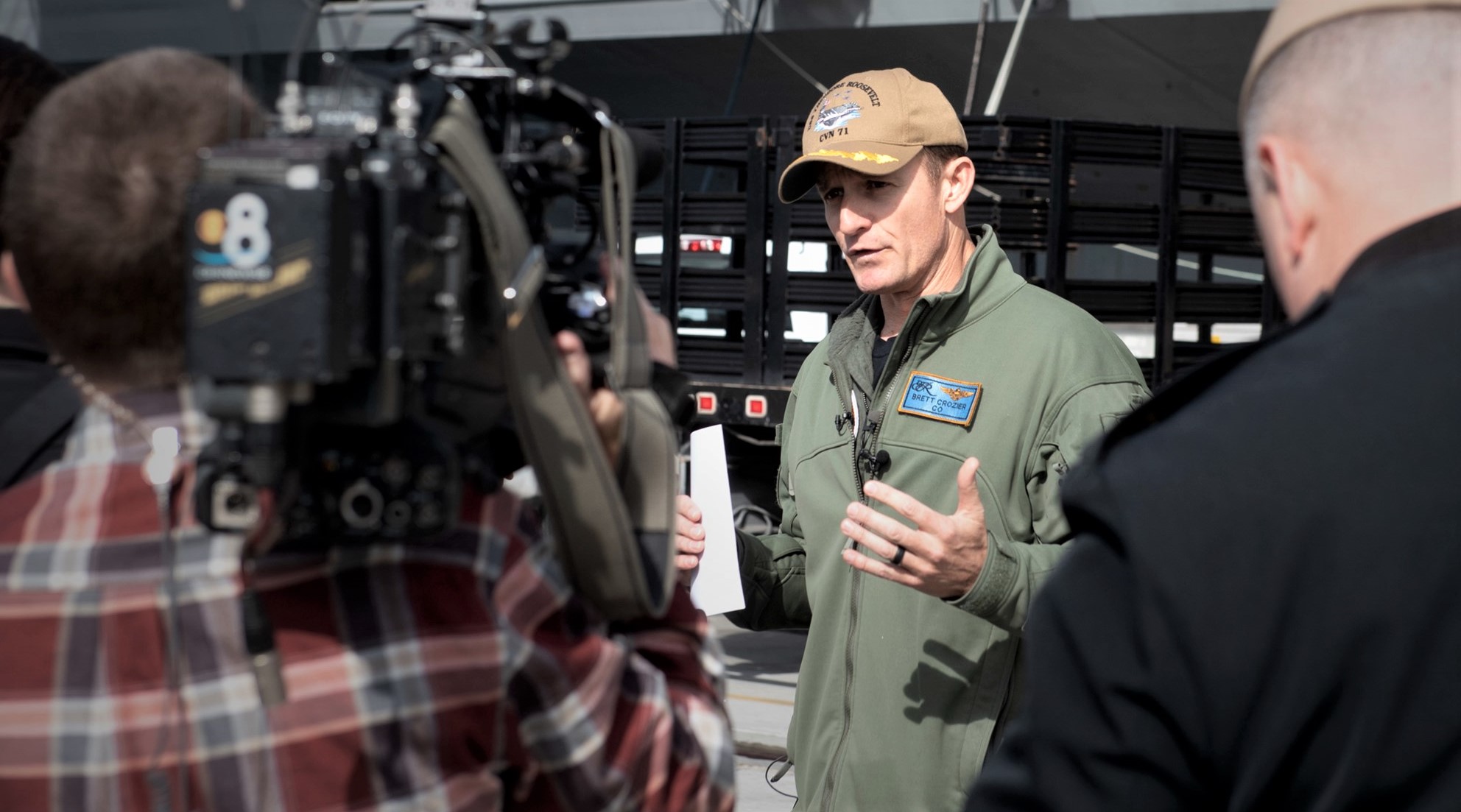Updates at the end of this commentary.
Military heroes are known for their immediate courage on the battlefield, but for some, ethical courage can be just as urgent. Just ask Captain Brett Crozier.

As the commander of the aircraft carrier Theodore Roosevelt, with a crew of 4,000 sailors, Capt. Crozier faced a challenge he never expected when he reported to superiors that more than 100 sailors were infected with the coronavirus.
Last Monday (Mar. 31), The San Francisco Chronicle released a copy they obtained of Crozier’s 4-page letter to Navy brass with the header: REQUEST FOR ASSISTANCE IN RESPONSE TO COVID-19 PANDEMIC
“This will require a political solution but it is the right thing to do,” Crozier wrote. “We are not at war. Sailors do not need to die. If we do not act now, we are failing to properly take care of our most trusted asset — our Sailors.”
While some of the infected soldiers had been off-loaded in Guam where the ship was docked, most of his men and women remained on the carrier. Crozier pleaded for their safety.
“Due to a warship’s inherent limitations of space, we are not [getting them off the carrier],” he wrote. “The spread of the disease is ongoing and accelerating. …
“Removing the majority of personnel from a deployed U.S. nuclear aircraft carrier and isolating them for two weeks may seem like an extraordinary measure. … This is a necessary risk,” Crozier wrote. “Keeping over 4,000 young men and women on board the TR is an unnecessary risk and breaks faith with those Sailors entrusted to our care.”
As word spread of the letter, Acting Navy Secretary Thomas Modly spoke to CNN.
“We don’t disagree with the (captain) on that ship and we’re doing it in a very methodical way because it’s not the same as a cruise ship, that ship has armaments on it, it has aircraft on it, we have to be able to fight fires if there are fires on board the ship, we have to run a nuclear power plant, so there’s a lot of things that we have to do on that ship that make it a little bit different and unique but we’re managing it and we’re working through it,” he said.
However, in a New York Times Op-Ed (Apr. 3), Tweed Roosevelt wrote, “Captain Crozier… paid a big price. The acting secretary of the Navy, Thomas Modly, summarily fired the captain, not for leaking the letter (for which he said he had no proof), but for showing ‘extremely poor judgment.’ Many disagree, believing that Captain Crozier showed excellent judgment.”
In his opinion piece that appeared in The New York Times, Tweed Roosevelt, the great-grandson of Teddy described a similar story by his great-grandfather.
“Before his rise to national politics, Roosevelt commanded the Rough Riders, a volunteer cavalry regiment, in the invasion of Cuba during the Spanish-American War. The Battle of San Juan Hill had been fought and won, and the war was basically over. However, the soldiers, still deployed in Cuba, faced a far worse enemy: yellow fever and malaria.
“As was usual in the days before modern medicine,” Tweed writes, “far more soldiers died of disease than of enemy action. The battlefield commanders, including Roosevelt, wanted to bring the soldiers home. But the leadership in Washington — in particular Russell Alger, the secretary of war — refused, fearing a political backlash. A standoff ensued.
“The career Army officers, who did not want to risk their jobs by being too outspoken, were stymied. Roosevelt, as a short-term volunteer, had less to lose. So, with the tacit approval of his fellow commanders, he wrote a fiery open letter and released it to the press.
“The letter, known as the ’round robin,’ was printed in virtually every newspaper in the country, creating an uproar demanding that the soldiers be brought home immediately.”
In his letter to Major-General Shafter, Teddy’s words sound remarkably similar to Capt. Crozier’s.
“SIR: In a meeting of the general and medical officers called by you at the Palace this morning we were all, as you know, unanimous in our views of what should be done with the army. To keep us here, in the opinion of every officer commanding a division or a brigade, will simply involve the destruction of thousands.”
After the letter had been leaked to the press, “Alger relented, and the troops were sent to quarantine on the end of Long Island, at Montauk Point. Though hundreds of men died of disease in Cuba, Roosevelt’s actions probably saved countless more.
“He did, however, pay a price,” Tweed adds, “Alger was furious with him. When Roosevelt’s nomination came up for a Medal of Honor, the secretary shot it down (Roosevelt eventually received the medal, posthumously, in 2001).”
While I understand the importance of strict military discipline and adherence to chains of command that are not to be questioned, extraordinary circumstances require extraordinary actions. They also require exceptional leaders who see that sometimes moral duty rises above their duty to military protocol.
In placing the lives of the men and women under his command above his own self-interest, Captain Crozier demonstrated the best qualities of a leader.
Leaving the ship for the last time, his sailors gave Capt. Crozier a well-earned supportive cheer.
Update: Captain Brett Crozier has tested positive for the virus.
Update (Apr. 7): Acting Navy secretary Thomas Modly resigned after profanity-laced criticism of Captain Crozier over a loud speaker to the crew of the Theodore Roosevelt.
Comments
Leave a Comment












With your post, hope we can carry this forward: “In placing the lives of the men and women under his command above his own self-interest, Captain Crozier demonstrated the best qualities of a leader.”